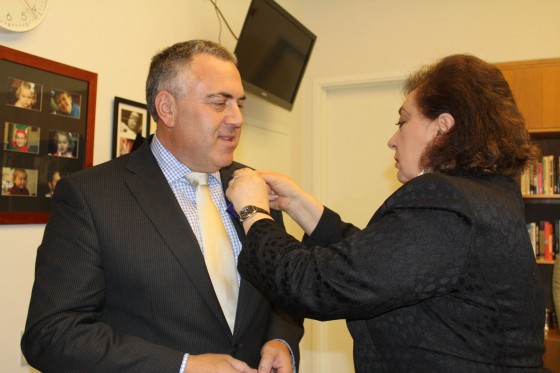
The so-called “Armenian Genocide” pin was worn by Australian Treasurer Joe Hockey as part of the visit to Australia by a delegation led by Armenia’s Diaspora Minister Hranush Hakobyan, Armenian news sites reported.
Although Armenian media outlets attempted to present the meeting as a great achievement as if the pin was worn by Australian parliamentarians, in fact Treasurer Joe Hockey (“Hockey” is an anglicised form of the original Armenian surname Hokeidonian) appeared to be the only high-ranking official wearing the pin.
Minister Hakobyan, who was sent to Australia by Armenian president Serzh Sargsyan to get support for recognition of the so-called “Armenian Genocide” against Turkey, apparently failed to fulfill his mission in Australia.
A number of attempts by Armenian lobby groups to achieve branding of the 1915 events as genocide in Australia have to date failed to get formal recognition after motions in New South Wales and South Australia moved by pro-Armenian MPs.
Australia Foreign Minister clarified on June 4, 2014 that Australian states and territories have no constitutional role in the formulation of the Australian foreign policy, and that Australia does not view the tragic events at the end of the Ottoman Empire as a genocide.
“While respecting the rights of individuals and groups to have strong views on the matter, the long-standing and clear approach of the Australian Government has been not to become involved in this sensitive debate, ” she wrote in a letter to Ertunc Ozen, President of Australian Turkish Advocacy Alliance (ATAA).
Armenia has lately increased its organized activities throughout the world for the recognition of their unfounded allegations in regard to the incidents of 1915 as “genocide” by national and local parliaments.
Armenia accuses the Ottoman authorities at that time of massacring large numbers of Armenians. Turkey rejects the claims, saying that 300,000 Armenians along with at least as many Turks died in civil strife that emerged when the Armenians took up arms for independence in eastern Anatolia.
Ankara’s attempts to resolve the issue has not so far get a concrete response from Yerevan.
In 2005, Turkey officially proposed the establishment of a joint commission comprised of historians and other experts from both sides to study the events of 1915, utilizing not only Turkish and Armenian archives, but also those of relevant third-party countries and to share their findings with the public.
Armenia has so far refused to open its archives or offer any documents while Turkey opened its own archives, and offered to give $20 million aid to the classification and opening of the Armenian archives in the U.S. city of Boston and several other places in the world for fair evaluation of the matter.
Editorial
